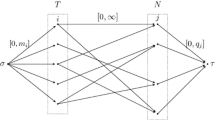Summary.
We consider the problem of allocating an infinitely divisible commodity among a group of agents with single-peaked preferences. Thomson (1994a), Sönmez (1994), and Moulin (1999) introduce three different resource-monotonicity conditions. In each characterization they derive, the axioms are independent. Under Pareto-optimality, the three resource-monotonicity conditions are equivalent. We investigate whether the interchange of these conditions still yields a valid characterization, and when the characterization still holds, whether it is a tight result or not. We strengthen each of the results, that is either the used resource-monotonicity condition can be replaced by a weaker one, or by using another resource-monotonicity condition, the result is not tight. Our main result is that when at least three agents are present, the class of fixed-path rationing methods is characterized by weak one-sided resource-monotonicity, strategy-proofness, and consistency.
Similar content being viewed by others
Author information
Authors and Affiliations
Additional information
Received: April 24, 2000; revised version: April 10, 2001
Rights and permissions
About this article
Cite this article
Ehlers, L. Resource-monotonic allocation when preferences are single-peaked. Econ Theory 20, 113–131 (2002). https://doi.org/10.1007/s001990100204
Issue Date:
DOI: https://doi.org/10.1007/s001990100204



